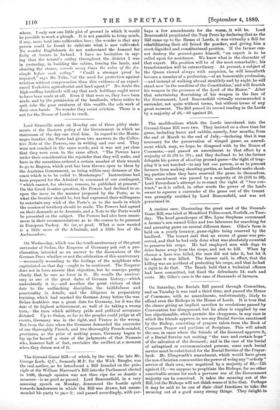The Ground-Game Bill—of which, by the way, the late Mr.
George Loch, Q.C., formerly M.P. for the Wick Burghs, was the real author, as he introduced a Bill founded on the prin- ciple of Sir William Harcourt's Bill into the Parliament elected in 1868, though opinion was not then ripe for so drastic a measure—is as good as passed. Lord Beaconsfield, in a very amusing speech on Monday, denounced the hostile spirit towards landowners in which the Bill was drawn, but recom- mended his party to pans it; and passed accordingly, with per- haps a few amendments for the worse, it will be. Lord Beaconsfield propitiated the Tory Peers by declaring that as the Bill came up to the House of Lords, it was virtually a Bill for rehabilitating their old friend the poacher, and giving him a most dignified and constitutional position. If the farmer can- not destroy the ground-game himself, " an expert is to be called upon for assistance. We know what is the character of that expert. His position will be of the most remarkable ; his transformation will be extraordinary.' At present, a subject of the Queen viewed always with suspicion, he will henceforth become a member of a profession,—of an honourable profession, —and instead of walking abroad stealthily and by night, he will stand now `in the sunshine of the Constitution,' and will flourish his weapon in the presence of the Lord of the Manor." After that entertaining flourishing of his weapon in the face of the Government, Lord Beaconsfield virtually recommended a surrender, not quite without terms, but without terms of any great moment. The Bill passed its second reading in the Lords by a majority of 48,-68 against 20.


































 Previous page
Previous page